Report on Legislations, Ethics, and CSR in Travel and Tourism
VerifiedAdded on 2020/07/23
|9
|2728
|430
Report
AI Summary
This report provides a comprehensive overview of the legal and ethical considerations within the travel and tourism sector. It delves into contract legislation, consumer protection, and the ethical dilemmas faced by businesses in this industry. The report examines the importance of corporate social responsibility (CSR) and its impact on the sector, including how businesses can contribute to societal welfare and sustainable practices. The analysis covers various aspects such as the impact of ethical issues, the need for sustainable approaches, and the role of CSR in enhancing the quality of services. Furthermore, the report discusses key legal requirements, including health, safety, and security laws, and emphasizes the significance of ethical practices to ensure the well-being of both employees and customers. The conclusion summarizes the key findings, reinforcing the importance of ethical conduct and legal compliance within the travel and tourism industry.
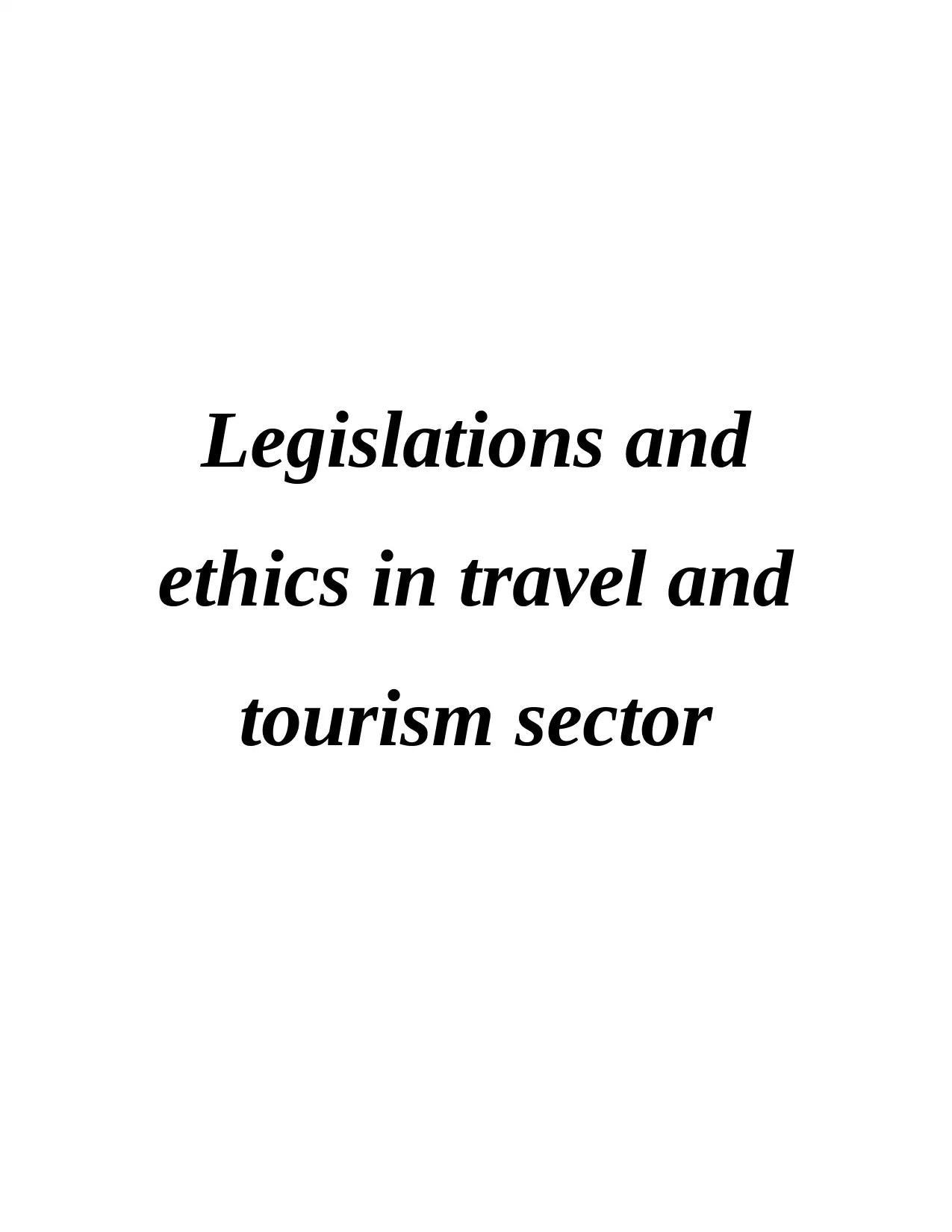
Legislations and
ethics in travel and
tourism sector
ethics in travel and
tourism sector
Paraphrase This Document
Need a fresh take? Get an instant paraphrase of this document with our AI Paraphraser
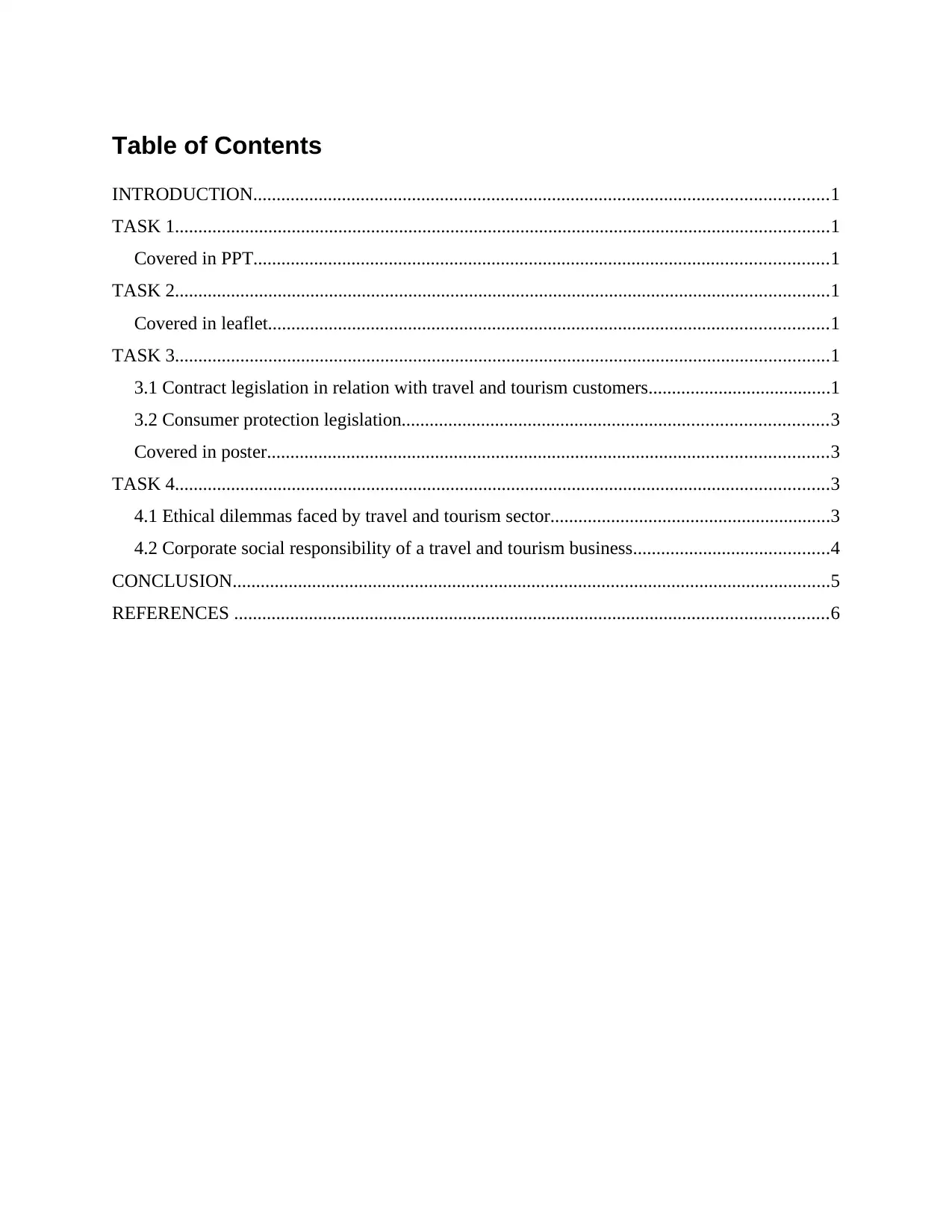
Table of Contents
INTRODUCTION...........................................................................................................................1
TASK 1............................................................................................................................................1
Covered in PPT...........................................................................................................................1
TASK 2............................................................................................................................................1
Covered in leaflet........................................................................................................................1
TASK 3............................................................................................................................................1
3.1 Contract legislation in relation with travel and tourism customers.......................................1
3.2 Consumer protection legislation...........................................................................................3
Covered in poster........................................................................................................................3
TASK 4............................................................................................................................................3
4.1 Ethical dilemmas faced by travel and tourism sector............................................................3
4.2 Corporate social responsibility of a travel and tourism business..........................................4
CONCLUSION................................................................................................................................5
REFERENCES ...............................................................................................................................6
INTRODUCTION...........................................................................................................................1
TASK 1............................................................................................................................................1
Covered in PPT...........................................................................................................................1
TASK 2............................................................................................................................................1
Covered in leaflet........................................................................................................................1
TASK 3............................................................................................................................................1
3.1 Contract legislation in relation with travel and tourism customers.......................................1
3.2 Consumer protection legislation...........................................................................................3
Covered in poster........................................................................................................................3
TASK 4............................................................................................................................................3
4.1 Ethical dilemmas faced by travel and tourism sector............................................................3
4.2 Corporate social responsibility of a travel and tourism business..........................................4
CONCLUSION................................................................................................................................5
REFERENCES ...............................................................................................................................6
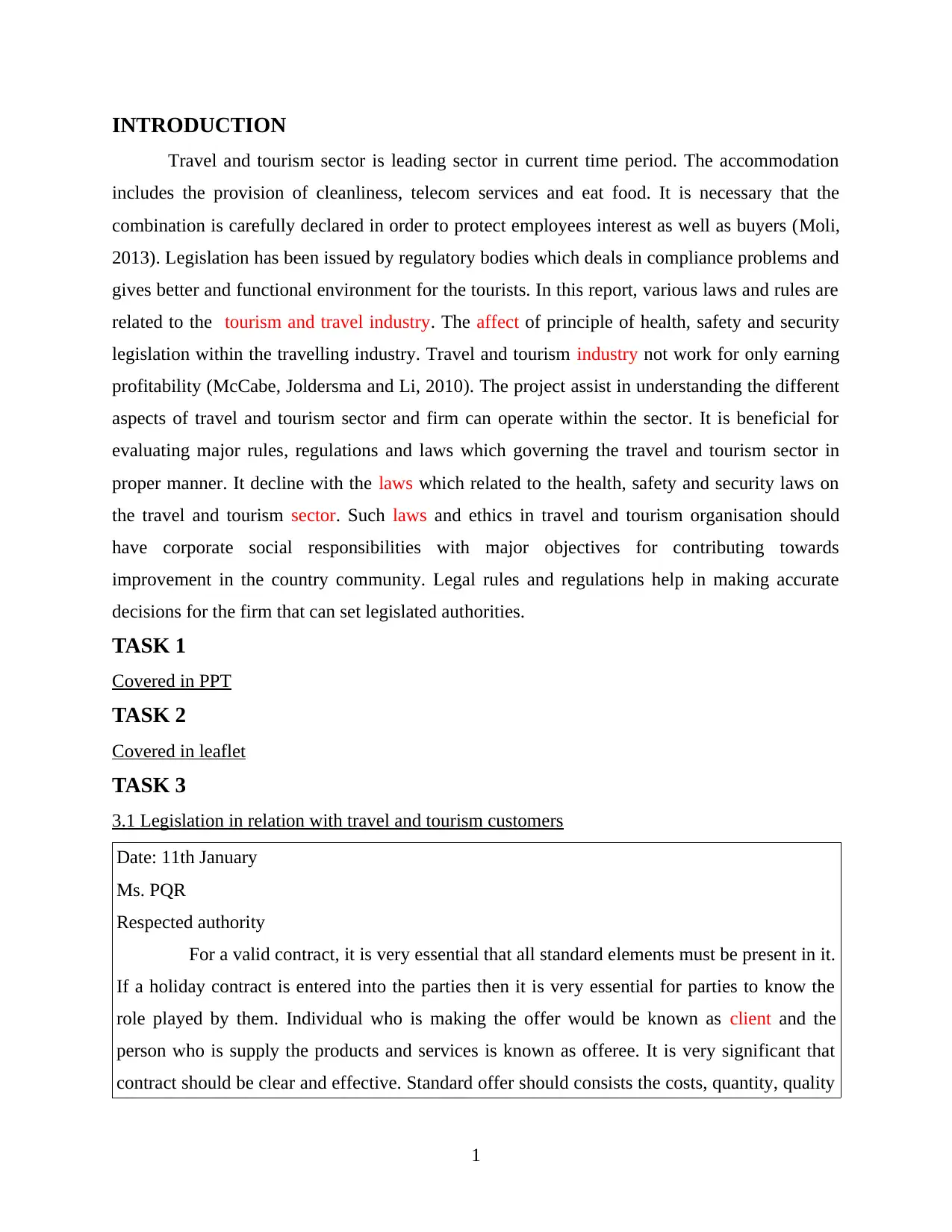
INTRODUCTION
Travel and tourism sector is leading sector in current time period. The accommodation
includes the provision of cleanliness, telecom services and eat food. It is necessary that the
combination is carefully declared in order to protect employees interest as well as buyers (Moli,
2013). Legislation has been issued by regulatory bodies which deals in compliance problems and
gives better and functional environment for the tourists. In this report, various laws and rules are
related to the tourism and travel industry. The affect of principle of health, safety and security
legislation within the travelling industry. Travel and tourism industry not work for only earning
profitability (McCabe, Joldersma and Li, 2010). The project assist in understanding the different
aspects of travel and tourism sector and firm can operate within the sector. It is beneficial for
evaluating major rules, regulations and laws which governing the travel and tourism sector in
proper manner. It decline with the laws which related to the health, safety and security laws on
the travel and tourism sector. Such laws and ethics in travel and tourism organisation should
have corporate social responsibilities with major objectives for contributing towards
improvement in the country community. Legal rules and regulations help in making accurate
decisions for the firm that can set legislated authorities.
TASK 1
Covered in PPT
TASK 2
Covered in leaflet
TASK 3
3.1 Legislation in relation with travel and tourism customers
Date: 11th January
Ms. PQR
Respected authority
For a valid contract, it is very essential that all standard elements must be present in it.
If a holiday contract is entered into the parties then it is very essential for parties to know the
role played by them. Individual who is making the offer would be known as client and the
person who is supply the products and services is known as offeree. It is very significant that
contract should be clear and effective. Standard offer should consists the costs, quantity, quality
1
Travel and tourism sector is leading sector in current time period. The accommodation
includes the provision of cleanliness, telecom services and eat food. It is necessary that the
combination is carefully declared in order to protect employees interest as well as buyers (Moli,
2013). Legislation has been issued by regulatory bodies which deals in compliance problems and
gives better and functional environment for the tourists. In this report, various laws and rules are
related to the tourism and travel industry. The affect of principle of health, safety and security
legislation within the travelling industry. Travel and tourism industry not work for only earning
profitability (McCabe, Joldersma and Li, 2010). The project assist in understanding the different
aspects of travel and tourism sector and firm can operate within the sector. It is beneficial for
evaluating major rules, regulations and laws which governing the travel and tourism sector in
proper manner. It decline with the laws which related to the health, safety and security laws on
the travel and tourism sector. Such laws and ethics in travel and tourism organisation should
have corporate social responsibilities with major objectives for contributing towards
improvement in the country community. Legal rules and regulations help in making accurate
decisions for the firm that can set legislated authorities.
TASK 1
Covered in PPT
TASK 2
Covered in leaflet
TASK 3
3.1 Legislation in relation with travel and tourism customers
Date: 11th January
Ms. PQR
Respected authority
For a valid contract, it is very essential that all standard elements must be present in it.
If a holiday contract is entered into the parties then it is very essential for parties to know the
role played by them. Individual who is making the offer would be known as client and the
person who is supply the products and services is known as offeree. It is very significant that
contract should be clear and effective. Standard offer should consists the costs, quantity, quality
1
⊘ This is a preview!⊘
Do you want full access?
Subscribe today to unlock all pages.

Trusted by 1+ million students worldwide
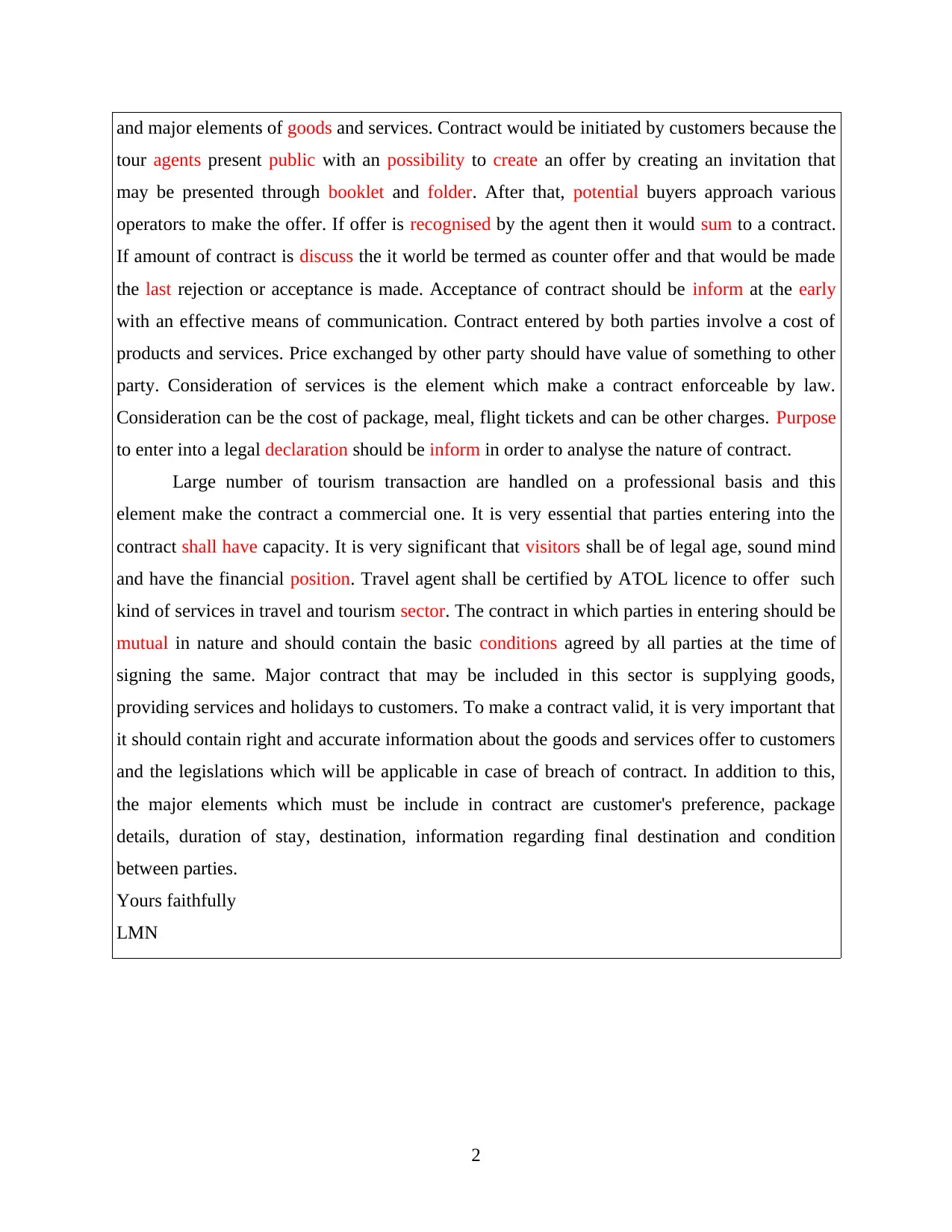
and major elements of goods and services. Contract would be initiated by customers because the
tour agents present public with an possibility to create an offer by creating an invitation that
may be presented through booklet and folder. After that, potential buyers approach various
operators to make the offer. If offer is recognised by the agent then it would sum to a contract.
If amount of contract is discuss the it world be termed as counter offer and that would be made
the last rejection or acceptance is made. Acceptance of contract should be inform at the early
with an effective means of communication. Contract entered by both parties involve a cost of
products and services. Price exchanged by other party should have value of something to other
party. Consideration of services is the element which make a contract enforceable by law.
Consideration can be the cost of package, meal, flight tickets and can be other charges. Purpose
to enter into a legal declaration should be inform in order to analyse the nature of contract.
Large number of tourism transaction are handled on a professional basis and this
element make the contract a commercial one. It is very essential that parties entering into the
contract shall have capacity. It is very significant that visitors shall be of legal age, sound mind
and have the financial position. Travel agent shall be certified by ATOL licence to offer such
kind of services in travel and tourism sector. The contract in which parties in entering should be
mutual in nature and should contain the basic conditions agreed by all parties at the time of
signing the same. Major contract that may be included in this sector is supplying goods,
providing services and holidays to customers. To make a contract valid, it is very important that
it should contain right and accurate information about the goods and services offer to customers
and the legislations which will be applicable in case of breach of contract. In addition to this,
the major elements which must be include in contract are customer's preference, package
details, duration of stay, destination, information regarding final destination and condition
between parties.
Yours faithfully
LMN
2
tour agents present public with an possibility to create an offer by creating an invitation that
may be presented through booklet and folder. After that, potential buyers approach various
operators to make the offer. If offer is recognised by the agent then it would sum to a contract.
If amount of contract is discuss the it world be termed as counter offer and that would be made
the last rejection or acceptance is made. Acceptance of contract should be inform at the early
with an effective means of communication. Contract entered by both parties involve a cost of
products and services. Price exchanged by other party should have value of something to other
party. Consideration of services is the element which make a contract enforceable by law.
Consideration can be the cost of package, meal, flight tickets and can be other charges. Purpose
to enter into a legal declaration should be inform in order to analyse the nature of contract.
Large number of tourism transaction are handled on a professional basis and this
element make the contract a commercial one. It is very essential that parties entering into the
contract shall have capacity. It is very significant that visitors shall be of legal age, sound mind
and have the financial position. Travel agent shall be certified by ATOL licence to offer such
kind of services in travel and tourism sector. The contract in which parties in entering should be
mutual in nature and should contain the basic conditions agreed by all parties at the time of
signing the same. Major contract that may be included in this sector is supplying goods,
providing services and holidays to customers. To make a contract valid, it is very important that
it should contain right and accurate information about the goods and services offer to customers
and the legislations which will be applicable in case of breach of contract. In addition to this,
the major elements which must be include in contract are customer's preference, package
details, duration of stay, destination, information regarding final destination and condition
between parties.
Yours faithfully
LMN
2
Paraphrase This Document
Need a fresh take? Get an instant paraphrase of this document with our AI Paraphraser
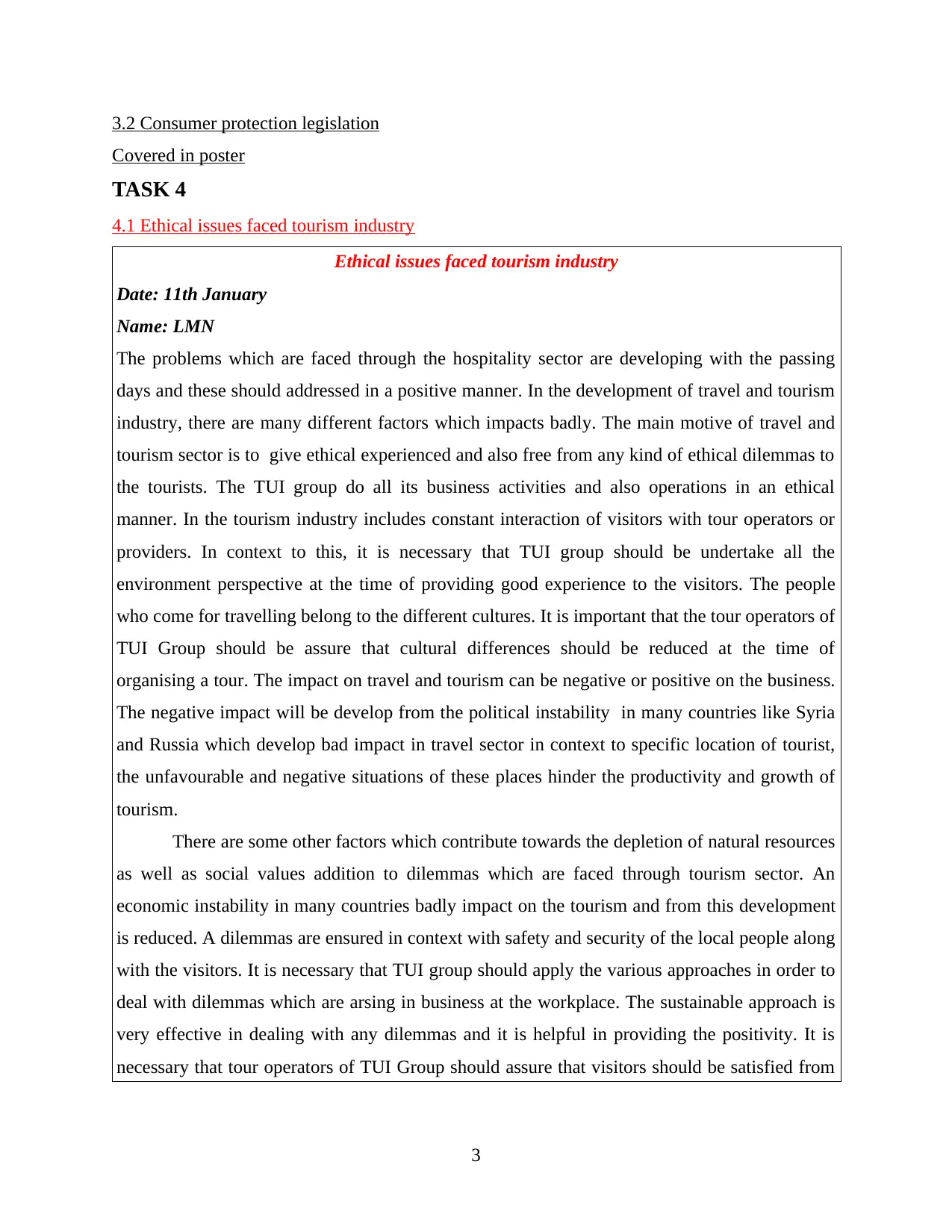
3.2 Consumer protection legislation
Covered in poster
TASK 4
4.1 Ethical issues faced tourism industry
Ethical issues faced tourism industry
Date: 11th January
Name: LMN
The problems which are faced through the hospitality sector are developing with the passing
days and these should addressed in a positive manner. In the development of travel and tourism
industry, there are many different factors which impacts badly. The main motive of travel and
tourism sector is to give ethical experienced and also free from any kind of ethical dilemmas to
the tourists. The TUI group do all its business activities and also operations in an ethical
manner. In the tourism industry includes constant interaction of visitors with tour operators or
providers. In context to this, it is necessary that TUI group should be undertake all the
environment perspective at the time of providing good experience to the visitors. The people
who come for travelling belong to the different cultures. It is important that the tour operators of
TUI Group should be assure that cultural differences should be reduced at the time of
organising a tour. The impact on travel and tourism can be negative or positive on the business.
The negative impact will be develop from the political instability in many countries like Syria
and Russia which develop bad impact in travel sector in context to specific location of tourist,
the unfavourable and negative situations of these places hinder the productivity and growth of
tourism.
There are some other factors which contribute towards the depletion of natural resources
as well as social values addition to dilemmas which are faced through tourism sector. An
economic instability in many countries badly impact on the tourism and from this development
is reduced. A dilemmas are ensured in context with safety and security of the local people along
with the visitors. It is necessary that TUI group should apply the various approaches in order to
deal with dilemmas which are arsing in business at the workplace. The sustainable approach is
very effective in dealing with any dilemmas and it is helpful in providing the positivity. It is
necessary that tour operators of TUI Group should assure that visitors should be satisfied from
3
Covered in poster
TASK 4
4.1 Ethical issues faced tourism industry
Ethical issues faced tourism industry
Date: 11th January
Name: LMN
The problems which are faced through the hospitality sector are developing with the passing
days and these should addressed in a positive manner. In the development of travel and tourism
industry, there are many different factors which impacts badly. The main motive of travel and
tourism sector is to give ethical experienced and also free from any kind of ethical dilemmas to
the tourists. The TUI group do all its business activities and also operations in an ethical
manner. In the tourism industry includes constant interaction of visitors with tour operators or
providers. In context to this, it is necessary that TUI group should be undertake all the
environment perspective at the time of providing good experience to the visitors. The people
who come for travelling belong to the different cultures. It is important that the tour operators of
TUI Group should be assure that cultural differences should be reduced at the time of
organising a tour. The impact on travel and tourism can be negative or positive on the business.
The negative impact will be develop from the political instability in many countries like Syria
and Russia which develop bad impact in travel sector in context to specific location of tourist,
the unfavourable and negative situations of these places hinder the productivity and growth of
tourism.
There are some other factors which contribute towards the depletion of natural resources
as well as social values addition to dilemmas which are faced through tourism sector. An
economic instability in many countries badly impact on the tourism and from this development
is reduced. A dilemmas are ensured in context with safety and security of the local people along
with the visitors. It is necessary that TUI group should apply the various approaches in order to
deal with dilemmas which are arsing in business at the workplace. The sustainable approach is
very effective in dealing with any dilemmas and it is helpful in providing the positivity. It is
necessary that tour operators of TUI Group should assure that visitors should be satisfied from
3
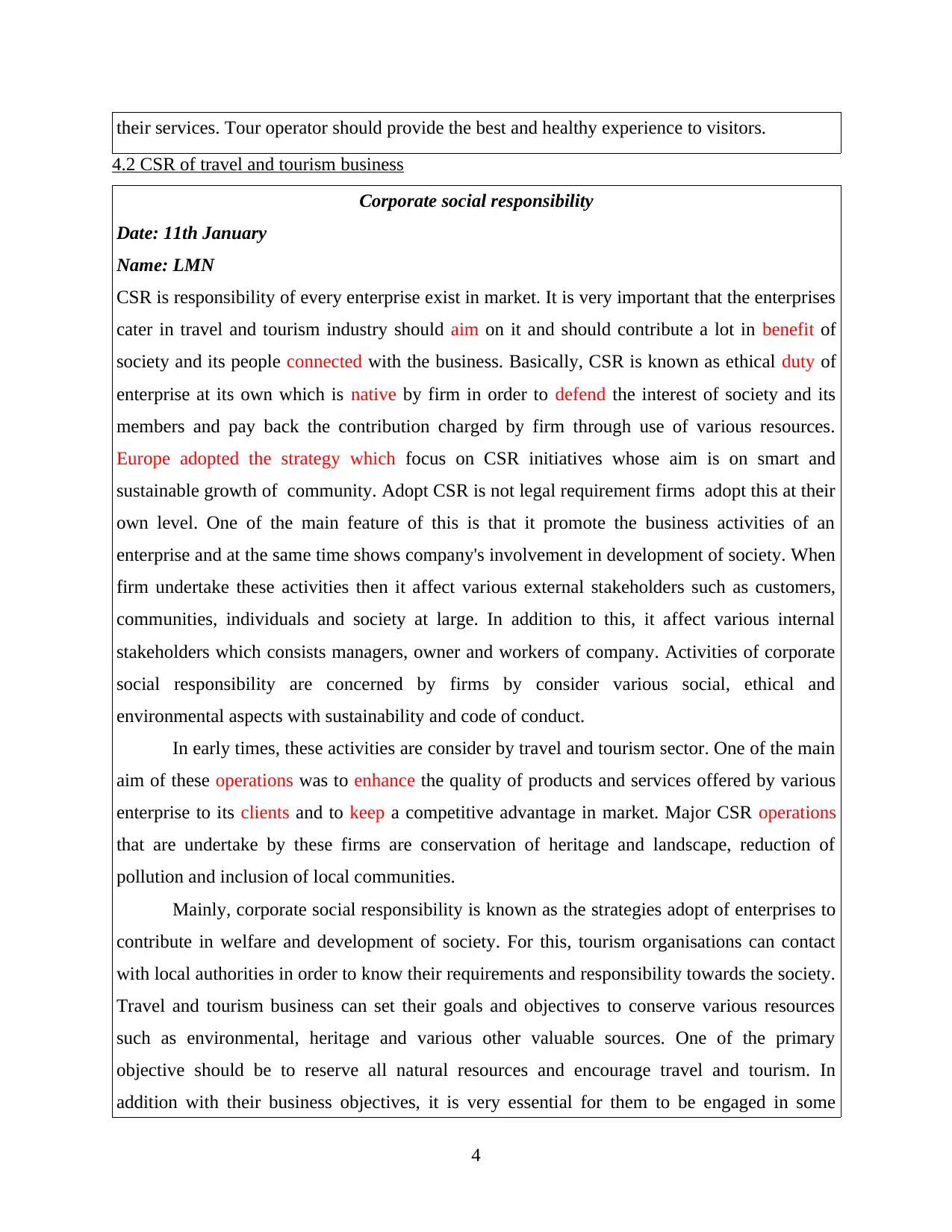
their services. Tour operator should provide the best and healthy experience to visitors.
4.2 CSR of travel and tourism business
Corporate social responsibility
Date: 11th January
Name: LMN
CSR is responsibility of every enterprise exist in market. It is very important that the enterprises
cater in travel and tourism industry should aim on it and should contribute a lot in benefit of
society and its people connected with the business. Basically, CSR is known as ethical duty of
enterprise at its own which is native by firm in order to defend the interest of society and its
members and pay back the contribution charged by firm through use of various resources.
Europe adopted the strategy which focus on CSR initiatives whose aim is on smart and
sustainable growth of community. Adopt CSR is not legal requirement firms adopt this at their
own level. One of the main feature of this is that it promote the business activities of an
enterprise and at the same time shows company's involvement in development of society. When
firm undertake these activities then it affect various external stakeholders such as customers,
communities, individuals and society at large. In addition to this, it affect various internal
stakeholders which consists managers, owner and workers of company. Activities of corporate
social responsibility are concerned by firms by consider various social, ethical and
environmental aspects with sustainability and code of conduct.
In early times, these activities are consider by travel and tourism sector. One of the main
aim of these operations was to enhance the quality of products and services offered by various
enterprise to its clients and to keep a competitive advantage in market. Major CSR operations
that are undertake by these firms are conservation of heritage and landscape, reduction of
pollution and inclusion of local communities.
Mainly, corporate social responsibility is known as the strategies adopt of enterprises to
contribute in welfare and development of society. For this, tourism organisations can contact
with local authorities in order to know their requirements and responsibility towards the society.
Travel and tourism business can set their goals and objectives to conserve various resources
such as environmental, heritage and various other valuable sources. One of the primary
objective should be to reserve all natural resources and encourage travel and tourism. In
addition with their business objectives, it is very essential for them to be engaged in some
4
4.2 CSR of travel and tourism business
Corporate social responsibility
Date: 11th January
Name: LMN
CSR is responsibility of every enterprise exist in market. It is very important that the enterprises
cater in travel and tourism industry should aim on it and should contribute a lot in benefit of
society and its people connected with the business. Basically, CSR is known as ethical duty of
enterprise at its own which is native by firm in order to defend the interest of society and its
members and pay back the contribution charged by firm through use of various resources.
Europe adopted the strategy which focus on CSR initiatives whose aim is on smart and
sustainable growth of community. Adopt CSR is not legal requirement firms adopt this at their
own level. One of the main feature of this is that it promote the business activities of an
enterprise and at the same time shows company's involvement in development of society. When
firm undertake these activities then it affect various external stakeholders such as customers,
communities, individuals and society at large. In addition to this, it affect various internal
stakeholders which consists managers, owner and workers of company. Activities of corporate
social responsibility are concerned by firms by consider various social, ethical and
environmental aspects with sustainability and code of conduct.
In early times, these activities are consider by travel and tourism sector. One of the main
aim of these operations was to enhance the quality of products and services offered by various
enterprise to its clients and to keep a competitive advantage in market. Major CSR operations
that are undertake by these firms are conservation of heritage and landscape, reduction of
pollution and inclusion of local communities.
Mainly, corporate social responsibility is known as the strategies adopt of enterprises to
contribute in welfare and development of society. For this, tourism organisations can contact
with local authorities in order to know their requirements and responsibility towards the society.
Travel and tourism business can set their goals and objectives to conserve various resources
such as environmental, heritage and various other valuable sources. One of the primary
objective should be to reserve all natural resources and encourage travel and tourism. In
addition with their business objectives, it is very essential for them to be engaged in some
4
⊘ This is a preview!⊘
Do you want full access?
Subscribe today to unlock all pages.

Trusted by 1+ million students worldwide
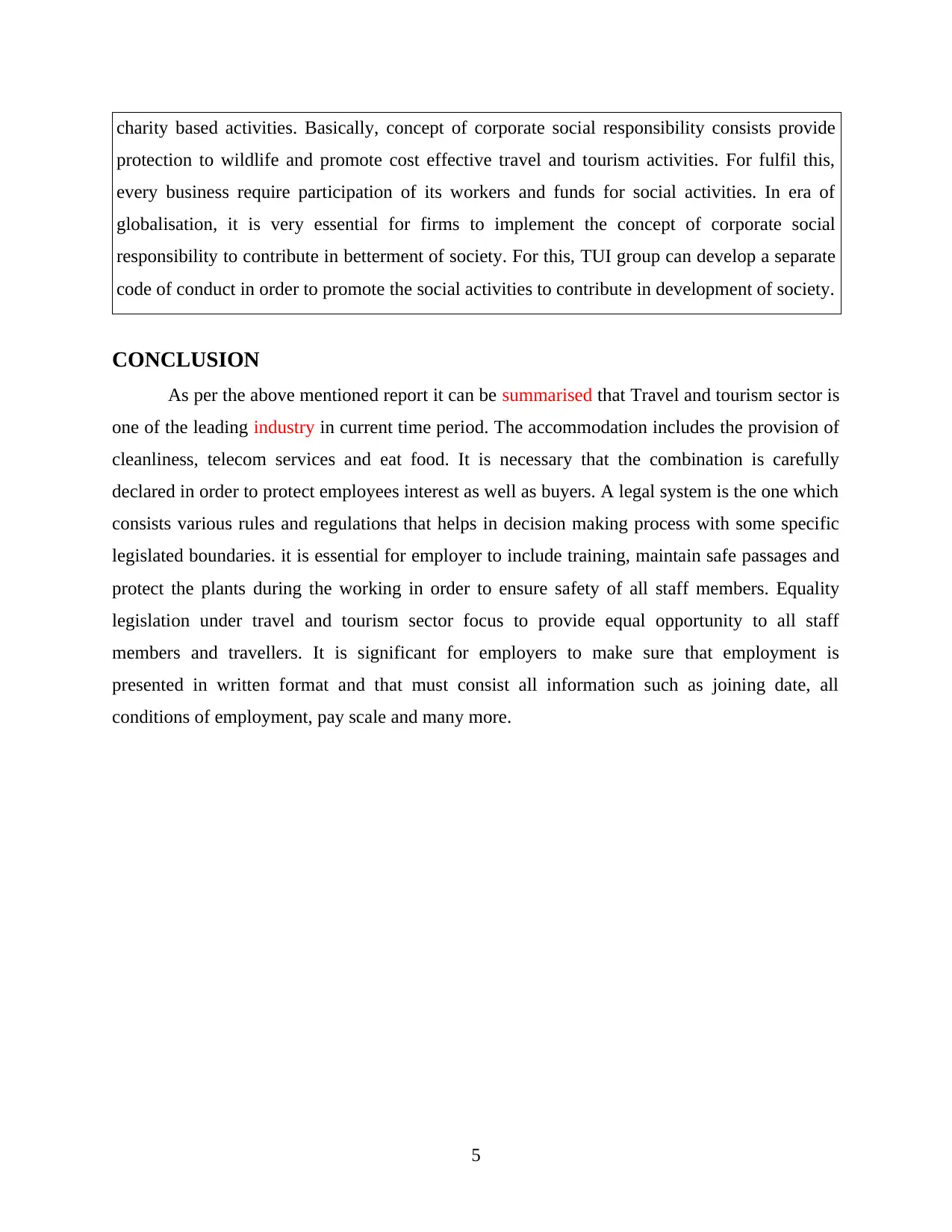
charity based activities. Basically, concept of corporate social responsibility consists provide
protection to wildlife and promote cost effective travel and tourism activities. For fulfil this,
every business require participation of its workers and funds for social activities. In era of
globalisation, it is very essential for firms to implement the concept of corporate social
responsibility to contribute in betterment of society. For this, TUI group can develop a separate
code of conduct in order to promote the social activities to contribute in development of society.
CONCLUSION
As per the above mentioned report it can be summarised that Travel and tourism sector is
one of the leading industry in current time period. The accommodation includes the provision of
cleanliness, telecom services and eat food. It is necessary that the combination is carefully
declared in order to protect employees interest as well as buyers. A legal system is the one which
consists various rules and regulations that helps in decision making process with some specific
legislated boundaries. it is essential for employer to include training, maintain safe passages and
protect the plants during the working in order to ensure safety of all staff members. Equality
legislation under travel and tourism sector focus to provide equal opportunity to all staff
members and travellers. It is significant for employers to make sure that employment is
presented in written format and that must consist all information such as joining date, all
conditions of employment, pay scale and many more.
5
protection to wildlife and promote cost effective travel and tourism activities. For fulfil this,
every business require participation of its workers and funds for social activities. In era of
globalisation, it is very essential for firms to implement the concept of corporate social
responsibility to contribute in betterment of society. For this, TUI group can develop a separate
code of conduct in order to promote the social activities to contribute in development of society.
CONCLUSION
As per the above mentioned report it can be summarised that Travel and tourism sector is
one of the leading industry in current time period. The accommodation includes the provision of
cleanliness, telecom services and eat food. It is necessary that the combination is carefully
declared in order to protect employees interest as well as buyers. A legal system is the one which
consists various rules and regulations that helps in decision making process with some specific
legislated boundaries. it is essential for employer to include training, maintain safe passages and
protect the plants during the working in order to ensure safety of all staff members. Equality
legislation under travel and tourism sector focus to provide equal opportunity to all staff
members and travellers. It is significant for employers to make sure that employment is
presented in written format and that must consist all information such as joining date, all
conditions of employment, pay scale and many more.
5
Paraphrase This Document
Need a fresh take? Get an instant paraphrase of this document with our AI Paraphraser
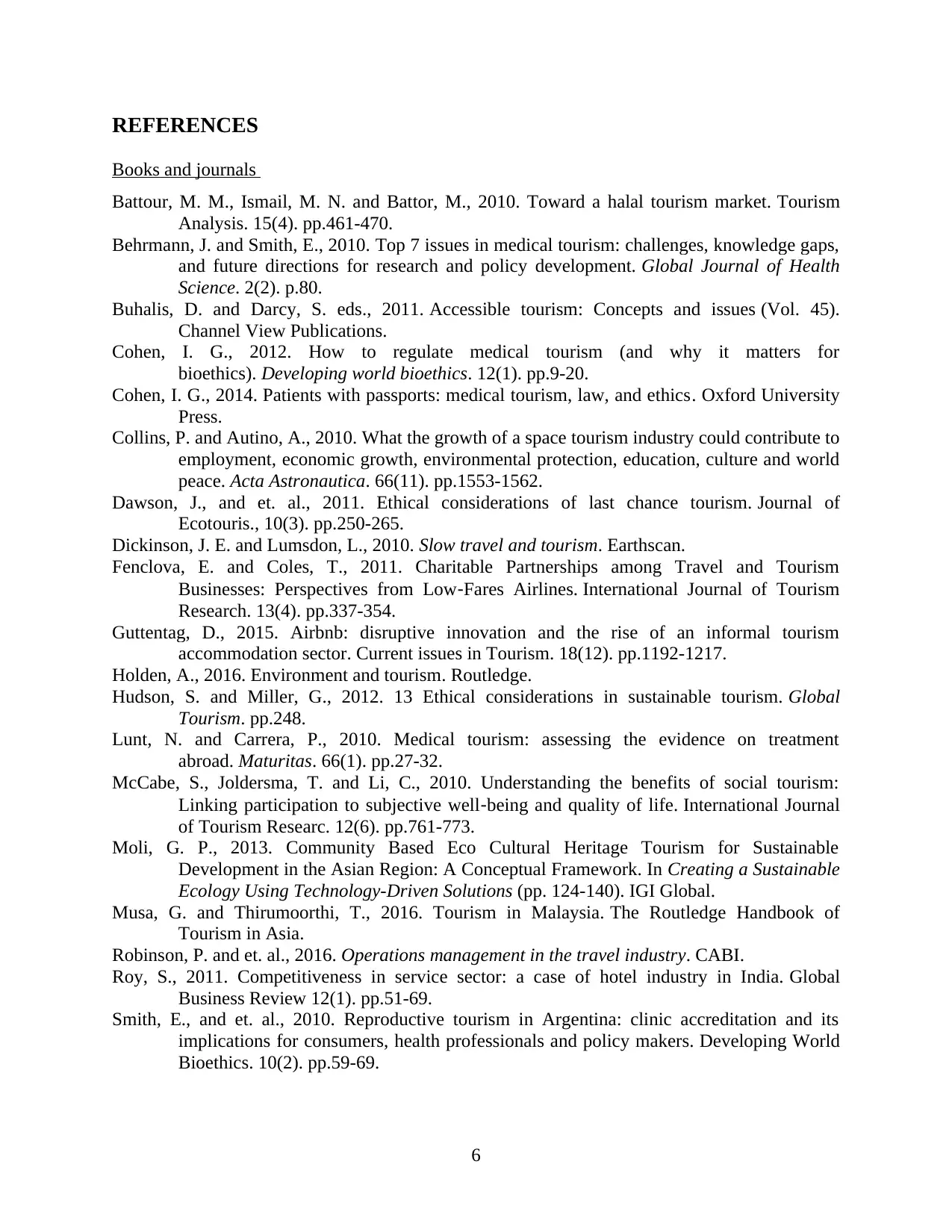
REFERENCES
Books and journals
Battour, M. M., Ismail, M. N. and Battor, M., 2010. Toward a halal tourism market. Tourism
Analysis. 15(4). pp.461-470.
Behrmann, J. and Smith, E., 2010. Top 7 issues in medical tourism: challenges, knowledge gaps,
and future directions for research and policy development. Global Journal of Health
Science. 2(2). p.80.
Buhalis, D. and Darcy, S. eds., 2011. Accessible tourism: Concepts and issues (Vol. 45).
Channel View Publications.
Cohen, I. G., 2012. How to regulate medical tourism (and why it matters for
bioethics). Developing world bioethics. 12(1). pp.9-20.
Cohen, I. G., 2014. Patients with passports: medical tourism, law, and ethics. Oxford University
Press.
Collins, P. and Autino, A., 2010. What the growth of a space tourism industry could contribute to
employment, economic growth, environmental protection, education, culture and world
peace. Acta Astronautica. 66(11). pp.1553-1562.
Dawson, J., and et. al., 2011. Ethical considerations of last chance tourism. Journal of
Ecotouris., 10(3). pp.250-265.
Dickinson, J. E. and Lumsdon, L., 2010. Slow travel and tourism. Earthscan.
Fenclova, E. and Coles, T., 2011. Charitable Partnerships among Travel and Tourism
Businesses: Perspectives from Low‐Fares Airlines. International Journal of Tourism
Research. 13(4). pp.337-354.
Guttentag, D., 2015. Airbnb: disruptive innovation and the rise of an informal tourism
accommodation sector. Current issues in Tourism. 18(12). pp.1192-1217.
Holden, A., 2016. Environment and tourism. Routledge.
Hudson, S. and Miller, G., 2012. 13 Ethical considerations in sustainable tourism. Global
Tourism. pp.248.
Lunt, N. and Carrera, P., 2010. Medical tourism: assessing the evidence on treatment
abroad. Maturitas. 66(1). pp.27-32.
McCabe, S., Joldersma, T. and Li, C., 2010. Understanding the benefits of social tourism:
Linking participation to subjective well‐being and quality of life. International Journal
of Tourism Researc. 12(6). pp.761-773.
Moli, G. P., 2013. Community Based Eco Cultural Heritage Tourism for Sustainable
Development in the Asian Region: A Conceptual Framework. In Creating a Sustainable
Ecology Using Technology-Driven Solutions (pp. 124-140). IGI Global.
Musa, G. and Thirumoorthi, T., 2016. Tourism in Malaysia. The Routledge Handbook of
Tourism in Asia.
Robinson, P. and et. al., 2016. Operations management in the travel industry. CABI.
Roy, S., 2011. Competitiveness in service sector: a case of hotel industry in India. Global
Business Review 12(1). pp.51-69.
Smith, E., and et. al., 2010. Reproductive tourism in Argentina: clinic accreditation and its
implications for consumers, health professionals and policy makers. Developing World
Bioethics. 10(2). pp.59-69.
6
Books and journals
Battour, M. M., Ismail, M. N. and Battor, M., 2010. Toward a halal tourism market. Tourism
Analysis. 15(4). pp.461-470.
Behrmann, J. and Smith, E., 2010. Top 7 issues in medical tourism: challenges, knowledge gaps,
and future directions for research and policy development. Global Journal of Health
Science. 2(2). p.80.
Buhalis, D. and Darcy, S. eds., 2011. Accessible tourism: Concepts and issues (Vol. 45).
Channel View Publications.
Cohen, I. G., 2012. How to regulate medical tourism (and why it matters for
bioethics). Developing world bioethics. 12(1). pp.9-20.
Cohen, I. G., 2014. Patients with passports: medical tourism, law, and ethics. Oxford University
Press.
Collins, P. and Autino, A., 2010. What the growth of a space tourism industry could contribute to
employment, economic growth, environmental protection, education, culture and world
peace. Acta Astronautica. 66(11). pp.1553-1562.
Dawson, J., and et. al., 2011. Ethical considerations of last chance tourism. Journal of
Ecotouris., 10(3). pp.250-265.
Dickinson, J. E. and Lumsdon, L., 2010. Slow travel and tourism. Earthscan.
Fenclova, E. and Coles, T., 2011. Charitable Partnerships among Travel and Tourism
Businesses: Perspectives from Low‐Fares Airlines. International Journal of Tourism
Research. 13(4). pp.337-354.
Guttentag, D., 2015. Airbnb: disruptive innovation and the rise of an informal tourism
accommodation sector. Current issues in Tourism. 18(12). pp.1192-1217.
Holden, A., 2016. Environment and tourism. Routledge.
Hudson, S. and Miller, G., 2012. 13 Ethical considerations in sustainable tourism. Global
Tourism. pp.248.
Lunt, N. and Carrera, P., 2010. Medical tourism: assessing the evidence on treatment
abroad. Maturitas. 66(1). pp.27-32.
McCabe, S., Joldersma, T. and Li, C., 2010. Understanding the benefits of social tourism:
Linking participation to subjective well‐being and quality of life. International Journal
of Tourism Researc. 12(6). pp.761-773.
Moli, G. P., 2013. Community Based Eco Cultural Heritage Tourism for Sustainable
Development in the Asian Region: A Conceptual Framework. In Creating a Sustainable
Ecology Using Technology-Driven Solutions (pp. 124-140). IGI Global.
Musa, G. and Thirumoorthi, T., 2016. Tourism in Malaysia. The Routledge Handbook of
Tourism in Asia.
Robinson, P. and et. al., 2016. Operations management in the travel industry. CABI.
Roy, S., 2011. Competitiveness in service sector: a case of hotel industry in India. Global
Business Review 12(1). pp.51-69.
Smith, E., and et. al., 2010. Reproductive tourism in Argentina: clinic accreditation and its
implications for consumers, health professionals and policy makers. Developing World
Bioethics. 10(2). pp.59-69.
6
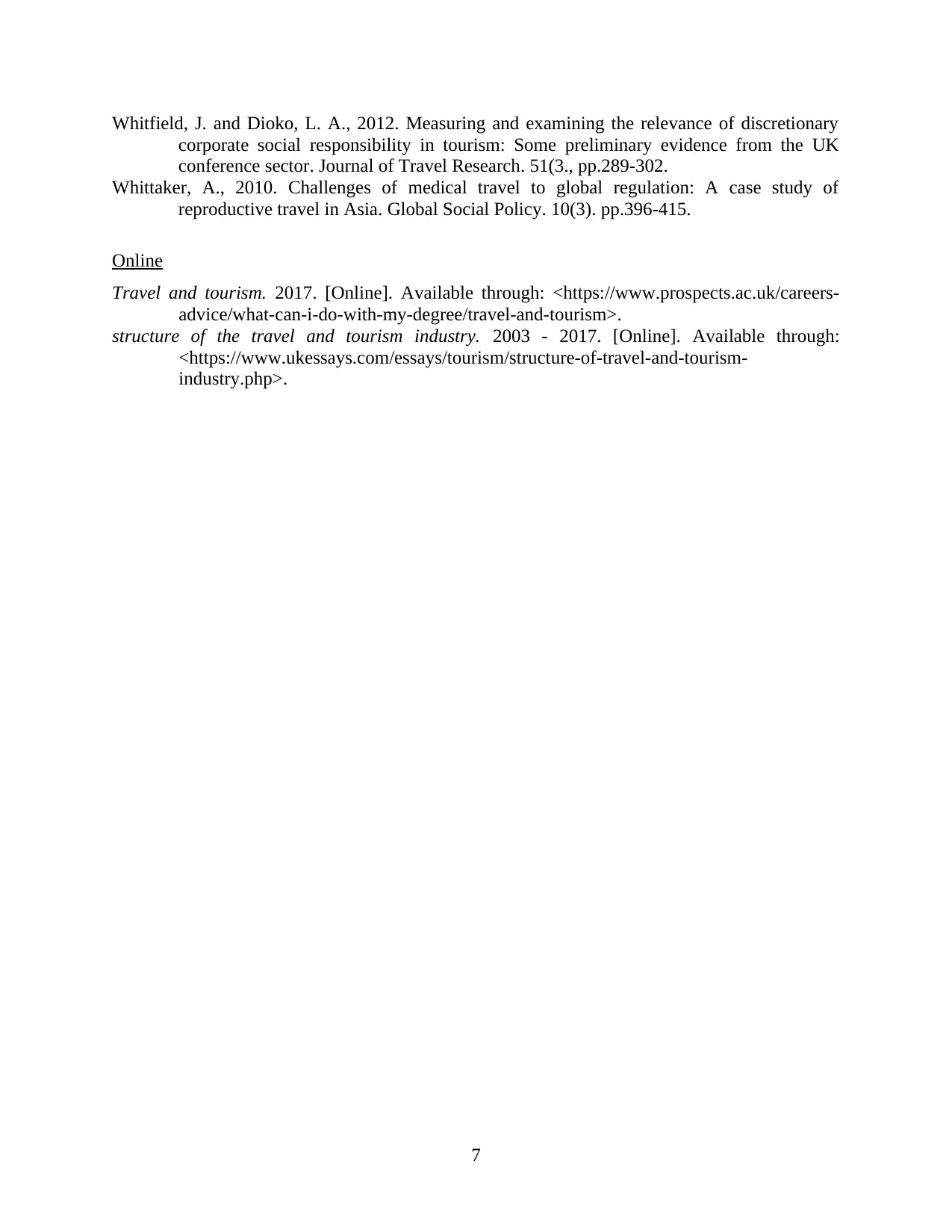
Whitfield, J. and Dioko, L. A., 2012. Measuring and examining the relevance of discretionary
corporate social responsibility in tourism: Some preliminary evidence from the UK
conference sector. Journal of Travel Research. 51(3., pp.289-302.
Whittaker, A., 2010. Challenges of medical travel to global regulation: A case study of
reproductive travel in Asia. Global Social Policy. 10(3). pp.396-415.
Online
Travel and tourism. 2017. [Online]. Available through: <https://www.prospects.ac.uk/careers-
advice/what-can-i-do-with-my-degree/travel-and-tourism>.
structure of the travel and tourism industry. 2003 - 2017. [Online]. Available through:
<https://www.ukessays.com/essays/tourism/structure-of-travel-and-tourism-
industry.php>.
7
corporate social responsibility in tourism: Some preliminary evidence from the UK
conference sector. Journal of Travel Research. 51(3., pp.289-302.
Whittaker, A., 2010. Challenges of medical travel to global regulation: A case study of
reproductive travel in Asia. Global Social Policy. 10(3). pp.396-415.
Online
Travel and tourism. 2017. [Online]. Available through: <https://www.prospects.ac.uk/careers-
advice/what-can-i-do-with-my-degree/travel-and-tourism>.
structure of the travel and tourism industry. 2003 - 2017. [Online]. Available through:
<https://www.ukessays.com/essays/tourism/structure-of-travel-and-tourism-
industry.php>.
7
⊘ This is a preview!⊘
Do you want full access?
Subscribe today to unlock all pages.

Trusted by 1+ million students worldwide
1 out of 9
Related Documents
Your All-in-One AI-Powered Toolkit for Academic Success.
+13062052269
info@desklib.com
Available 24*7 on WhatsApp / Email
![[object Object]](/_next/static/media/star-bottom.7253800d.svg)
Unlock your academic potential
Copyright © 2020–2026 A2Z Services. All Rights Reserved. Developed and managed by ZUCOL.


